Analyzing the Social Responsibility of Business in Profit Maximization
VerifiedAdded on 2021/02/19
|8
|2546
|254
Essay
AI Summary
This essay explores the concept of social responsibility in business and its relationship to profit maximization. It begins by defining social responsibility as the obligation of businesses to operate in a way that benefits society as a whole. The essay then delves into the argument that the primary social responsibility of a business is indeed to increase its profits, supporting this claim with various theories and examples. It examines the Corporate Social Responsibility (CSR) theory, which includes economic, legal, ethical, and philanthropic responsibilities, illustrating how each contributes to a company's financial success and positive public image. The essay also discusses the Triple Bottom Line theory, focusing on people, planet, and profit, demonstrating how businesses can achieve long-term profitability by considering social and environmental impacts. Examples such as the British Army and Tesco are used to illustrate these concepts, highlighting how socially responsible practices can lead to increased profits through ethical operations, improved employee relations, and enhanced brand reputation. The conclusion reinforces the idea that businesses can and should prioritize social responsibility to achieve sustained profitability and societal benefit.
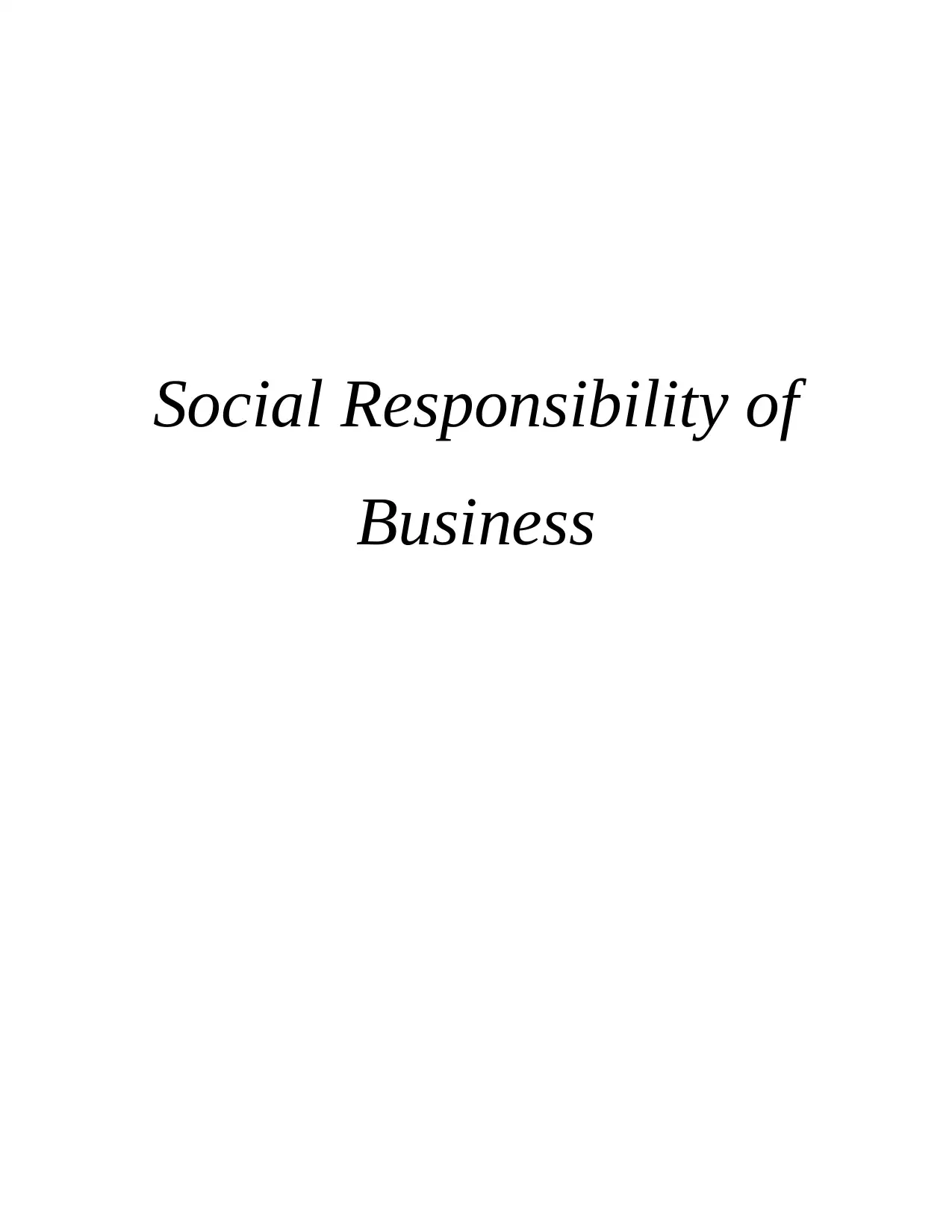
Social Responsibility of
Business
Business
Paraphrase This Document
Need a fresh take? Get an instant paraphrase of this document with our AI Paraphraser
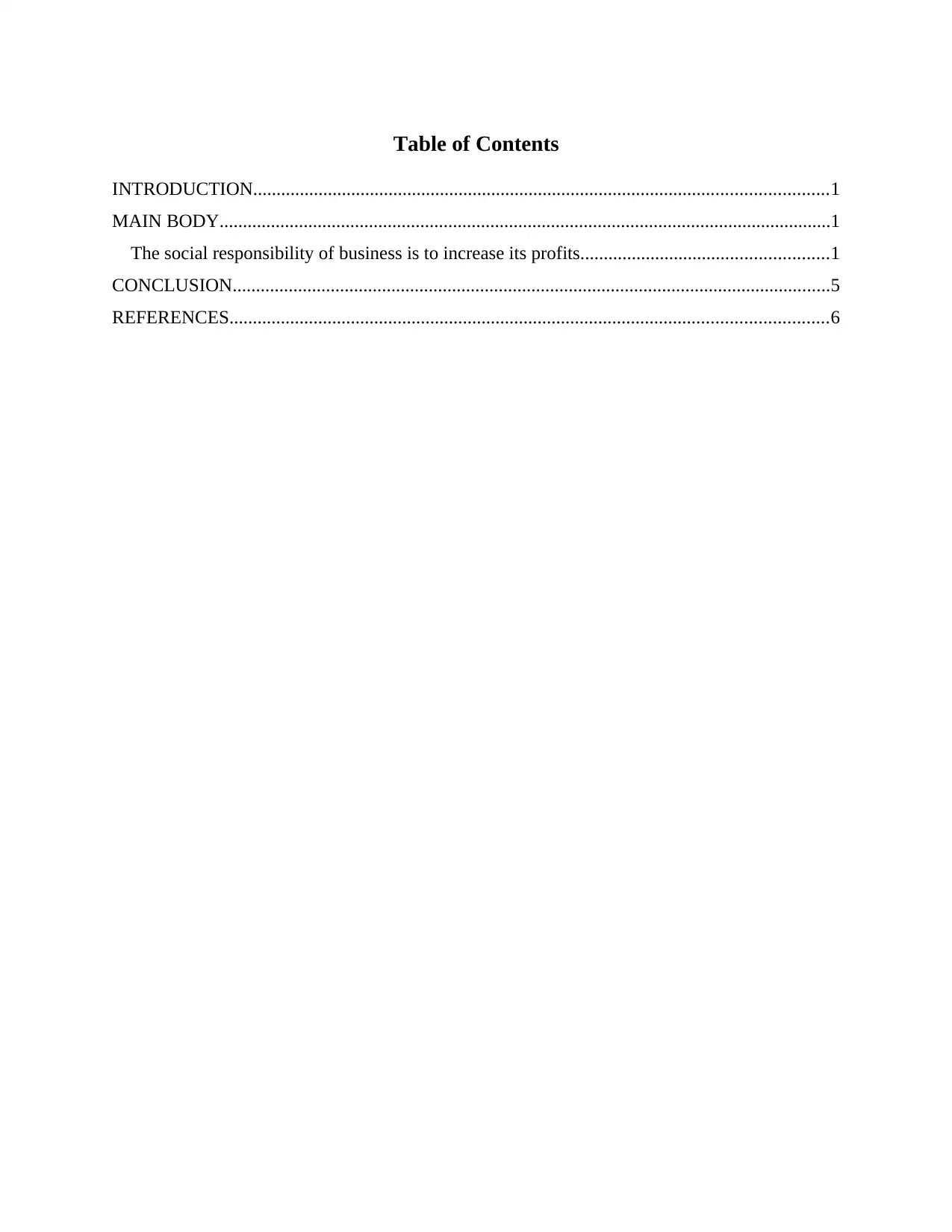
Table of Contents
INTRODUCTION...........................................................................................................................1
MAIN BODY...................................................................................................................................1
The social responsibility of business is to increase its profits.....................................................1
CONCLUSION................................................................................................................................5
REFERENCES................................................................................................................................6
INTRODUCTION...........................................................................................................................1
MAIN BODY...................................................................................................................................1
The social responsibility of business is to increase its profits.....................................................1
CONCLUSION................................................................................................................................5
REFERENCES................................................................................................................................6
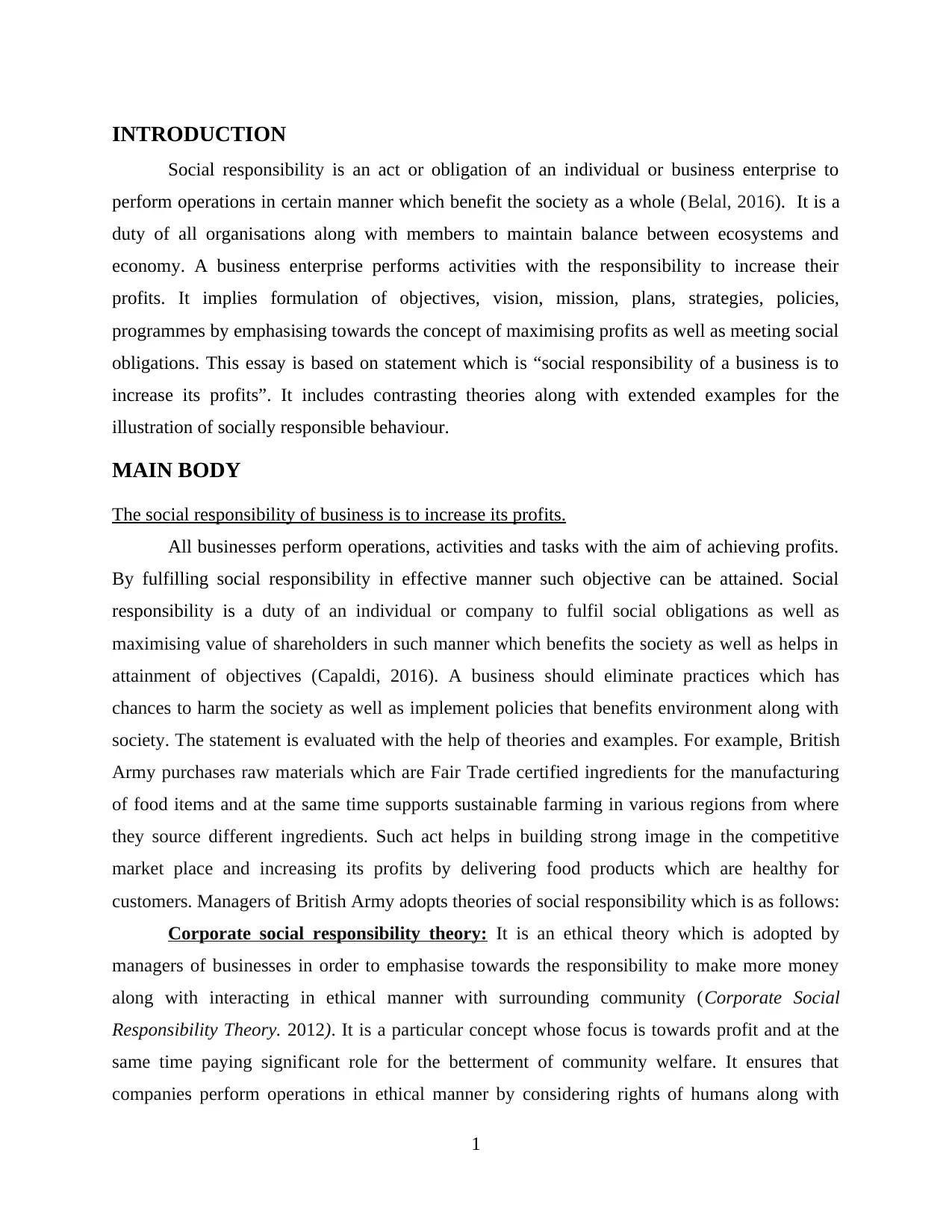
INTRODUCTION
Social responsibility is an act or obligation of an individual or business enterprise to
perform operations in certain manner which benefit the society as a whole (Belal, 2016). It is a
duty of all organisations along with members to maintain balance between ecosystems and
economy. A business enterprise performs activities with the responsibility to increase their
profits. It implies formulation of objectives, vision, mission, plans, strategies, policies,
programmes by emphasising towards the concept of maximising profits as well as meeting social
obligations. This essay is based on statement which is “social responsibility of a business is to
increase its profits”. It includes contrasting theories along with extended examples for the
illustration of socially responsible behaviour.
MAIN BODY
The social responsibility of business is to increase its profits.
All businesses perform operations, activities and tasks with the aim of achieving profits.
By fulfilling social responsibility in effective manner such objective can be attained. Social
responsibility is a duty of an individual or company to fulfil social obligations as well as
maximising value of shareholders in such manner which benefits the society as well as helps in
attainment of objectives (Capaldi, 2016). A business should eliminate practices which has
chances to harm the society as well as implement policies that benefits environment along with
society. The statement is evaluated with the help of theories and examples. For example, British
Army purchases raw materials which are Fair Trade certified ingredients for the manufacturing
of food items and at the same time supports sustainable farming in various regions from where
they source different ingredients. Such act helps in building strong image in the competitive
market place and increasing its profits by delivering food products which are healthy for
customers. Managers of British Army adopts theories of social responsibility which is as follows:
Corporate social responsibility theory: It is an ethical theory which is adopted by
managers of businesses in order to emphasise towards the responsibility to make more money
along with interacting in ethical manner with surrounding community (Corporate Social
Responsibility Theory. 2012). It is a particular concept whose focus is towards profit and at the
same time paying significant role for the betterment of community welfare. It ensures that
companies perform operations in ethical manner by considering rights of humans along with
1
Social responsibility is an act or obligation of an individual or business enterprise to
perform operations in certain manner which benefit the society as a whole (Belal, 2016). It is a
duty of all organisations along with members to maintain balance between ecosystems and
economy. A business enterprise performs activities with the responsibility to increase their
profits. It implies formulation of objectives, vision, mission, plans, strategies, policies,
programmes by emphasising towards the concept of maximising profits as well as meeting social
obligations. This essay is based on statement which is “social responsibility of a business is to
increase its profits”. It includes contrasting theories along with extended examples for the
illustration of socially responsible behaviour.
MAIN BODY
The social responsibility of business is to increase its profits.
All businesses perform operations, activities and tasks with the aim of achieving profits.
By fulfilling social responsibility in effective manner such objective can be attained. Social
responsibility is a duty of an individual or company to fulfil social obligations as well as
maximising value of shareholders in such manner which benefits the society as well as helps in
attainment of objectives (Capaldi, 2016). A business should eliminate practices which has
chances to harm the society as well as implement policies that benefits environment along with
society. The statement is evaluated with the help of theories and examples. For example, British
Army purchases raw materials which are Fair Trade certified ingredients for the manufacturing
of food items and at the same time supports sustainable farming in various regions from where
they source different ingredients. Such act helps in building strong image in the competitive
market place and increasing its profits by delivering food products which are healthy for
customers. Managers of British Army adopts theories of social responsibility which is as follows:
Corporate social responsibility theory: It is an ethical theory which is adopted by
managers of businesses in order to emphasise towards the responsibility to make more money
along with interacting in ethical manner with surrounding community (Corporate Social
Responsibility Theory. 2012). It is a particular concept whose focus is towards profit and at the
same time paying significant role for the betterment of community welfare. It ensures that
companies perform operations in ethical manner by considering rights of humans along with
1
⊘ This is a preview!⊘
Do you want full access?
Subscribe today to unlock all pages.

Trusted by 1+ million students worldwide
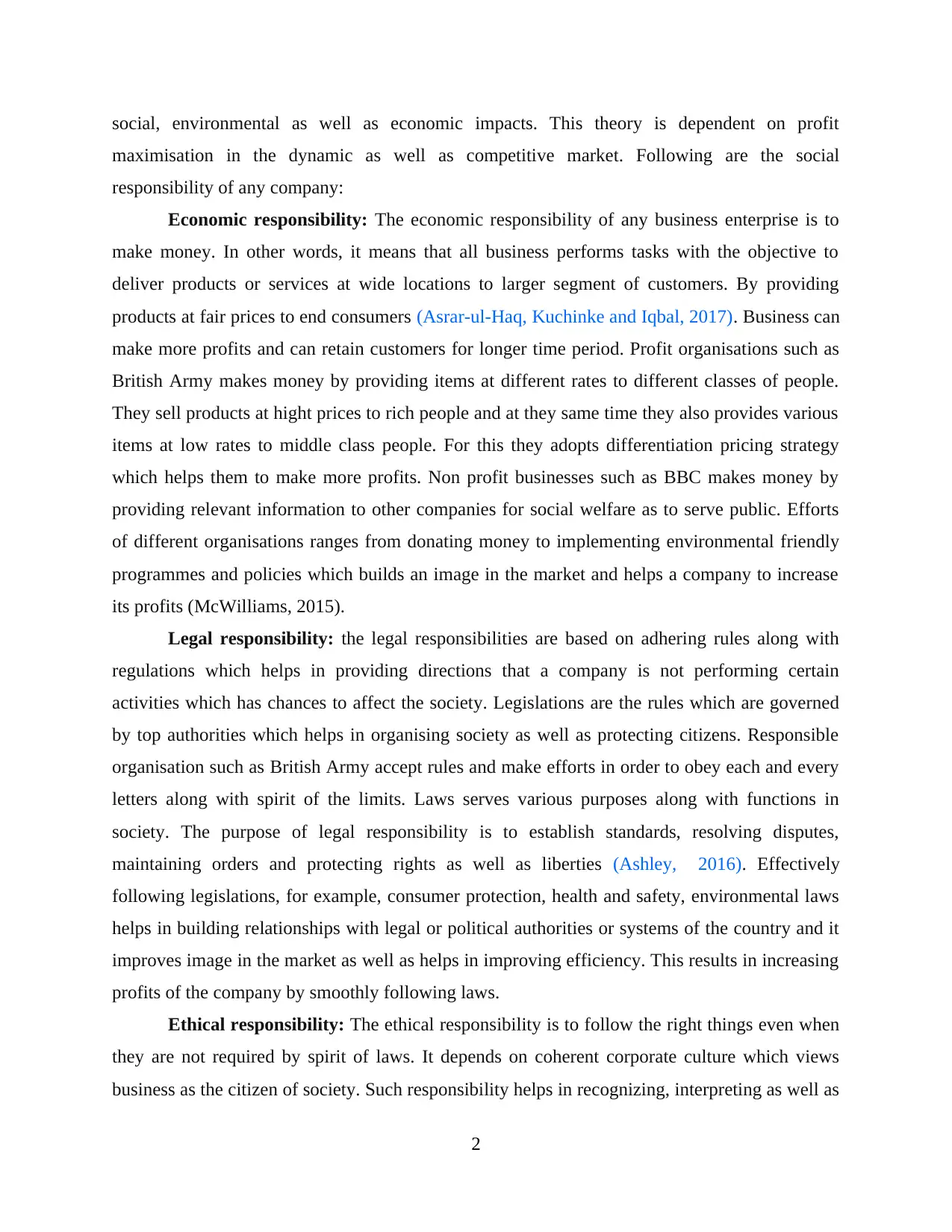
social, environmental as well as economic impacts. This theory is dependent on profit
maximisation in the dynamic as well as competitive market. Following are the social
responsibility of any company:
Economic responsibility: The economic responsibility of any business enterprise is to
make money. In other words, it means that all business performs tasks with the objective to
deliver products or services at wide locations to larger segment of customers. By providing
products at fair prices to end consumers (Asrar-ul-Haq, Kuchinke and Iqbal, 2017). Business can
make more profits and can retain customers for longer time period. Profit organisations such as
British Army makes money by providing items at different rates to different classes of people.
They sell products at hight prices to rich people and at they same time they also provides various
items at low rates to middle class people. For this they adopts differentiation pricing strategy
which helps them to make more profits. Non profit businesses such as BBC makes money by
providing relevant information to other companies for social welfare as to serve public. Efforts
of different organisations ranges from donating money to implementing environmental friendly
programmes and policies which builds an image in the market and helps a company to increase
its profits (McWilliams, 2015).
Legal responsibility: the legal responsibilities are based on adhering rules along with
regulations which helps in providing directions that a company is not performing certain
activities which has chances to affect the society. Legislations are the rules which are governed
by top authorities which helps in organising society as well as protecting citizens. Responsible
organisation such as British Army accept rules and make efforts in order to obey each and every
letters along with spirit of the limits. Laws serves various purposes along with functions in
society. The purpose of legal responsibility is to establish standards, resolving disputes,
maintaining orders and protecting rights as well as liberties (Ashley, 2016). Effectively
following legislations, for example, consumer protection, health and safety, environmental laws
helps in building relationships with legal or political authorities or systems of the country and it
improves image in the market as well as helps in improving efficiency. This results in increasing
profits of the company by smoothly following laws.
Ethical responsibility: The ethical responsibility is to follow the right things even when
they are not required by spirit of laws. It depends on coherent corporate culture which views
business as the citizen of society. Such responsibility helps in recognizing, interpreting as well as
2
maximisation in the dynamic as well as competitive market. Following are the social
responsibility of any company:
Economic responsibility: The economic responsibility of any business enterprise is to
make money. In other words, it means that all business performs tasks with the objective to
deliver products or services at wide locations to larger segment of customers. By providing
products at fair prices to end consumers (Asrar-ul-Haq, Kuchinke and Iqbal, 2017). Business can
make more profits and can retain customers for longer time period. Profit organisations such as
British Army makes money by providing items at different rates to different classes of people.
They sell products at hight prices to rich people and at they same time they also provides various
items at low rates to middle class people. For this they adopts differentiation pricing strategy
which helps them to make more profits. Non profit businesses such as BBC makes money by
providing relevant information to other companies for social welfare as to serve public. Efforts
of different organisations ranges from donating money to implementing environmental friendly
programmes and policies which builds an image in the market and helps a company to increase
its profits (McWilliams, 2015).
Legal responsibility: the legal responsibilities are based on adhering rules along with
regulations which helps in providing directions that a company is not performing certain
activities which has chances to affect the society. Legislations are the rules which are governed
by top authorities which helps in organising society as well as protecting citizens. Responsible
organisation such as British Army accept rules and make efforts in order to obey each and every
letters along with spirit of the limits. Laws serves various purposes along with functions in
society. The purpose of legal responsibility is to establish standards, resolving disputes,
maintaining orders and protecting rights as well as liberties (Ashley, 2016). Effectively
following legislations, for example, consumer protection, health and safety, environmental laws
helps in building relationships with legal or political authorities or systems of the country and it
improves image in the market as well as helps in improving efficiency. This results in increasing
profits of the company by smoothly following laws.
Ethical responsibility: The ethical responsibility is to follow the right things even when
they are not required by spirit of laws. It depends on coherent corporate culture which views
business as the citizen of society. Such responsibility helps in recognizing, interpreting as well as
2
Paraphrase This Document
Need a fresh take? Get an instant paraphrase of this document with our AI Paraphraser
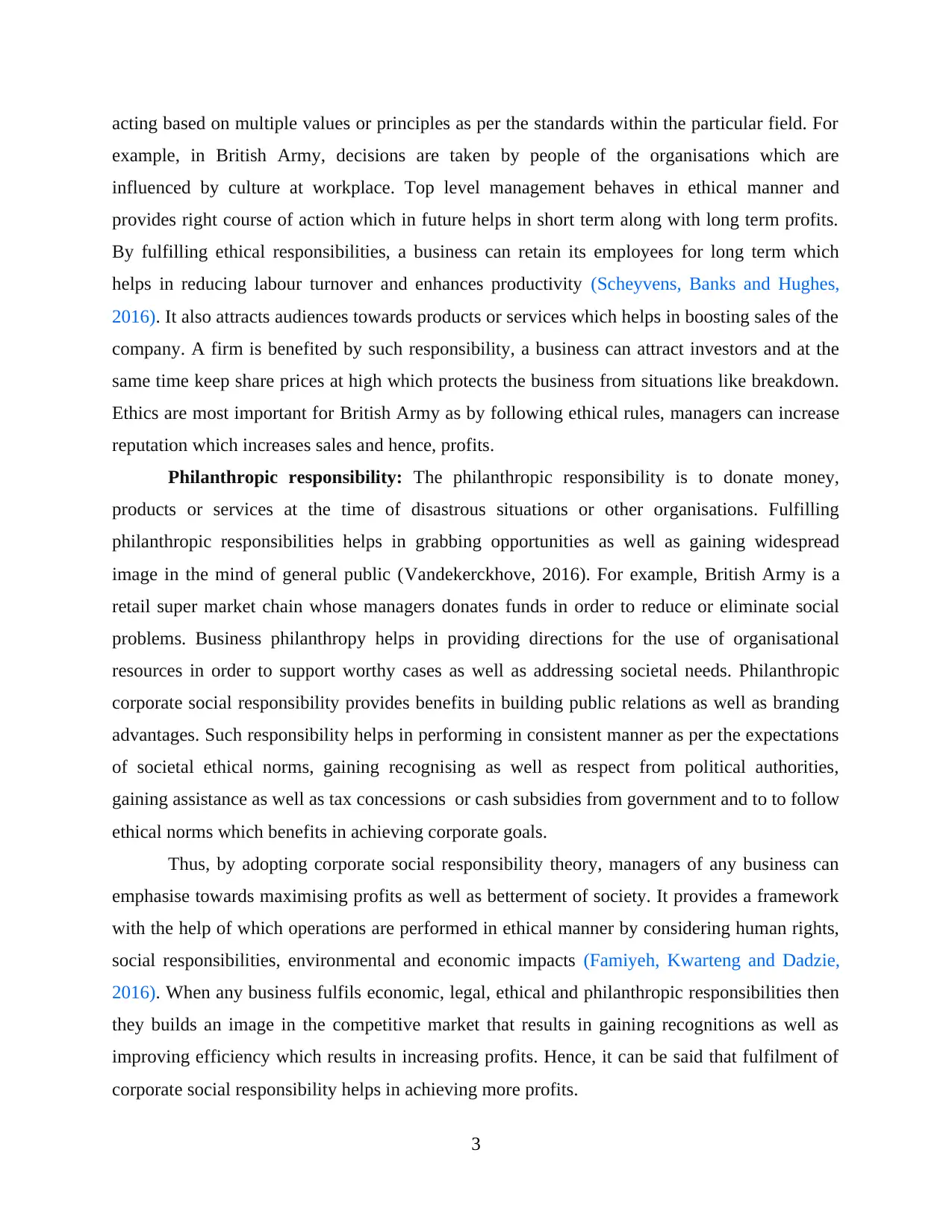
acting based on multiple values or principles as per the standards within the particular field. For
example, in British Army, decisions are taken by people of the organisations which are
influenced by culture at workplace. Top level management behaves in ethical manner and
provides right course of action which in future helps in short term along with long term profits.
By fulfilling ethical responsibilities, a business can retain its employees for long term which
helps in reducing labour turnover and enhances productivity (Scheyvens, Banks and Hughes,
2016). It also attracts audiences towards products or services which helps in boosting sales of the
company. A firm is benefited by such responsibility, a business can attract investors and at the
same time keep share prices at high which protects the business from situations like breakdown.
Ethics are most important for British Army as by following ethical rules, managers can increase
reputation which increases sales and hence, profits.
Philanthropic responsibility: The philanthropic responsibility is to donate money,
products or services at the time of disastrous situations or other organisations. Fulfilling
philanthropic responsibilities helps in grabbing opportunities as well as gaining widespread
image in the mind of general public (Vandekerckhove, 2016). For example, British Army is a
retail super market chain whose managers donates funds in order to reduce or eliminate social
problems. Business philanthropy helps in providing directions for the use of organisational
resources in order to support worthy cases as well as addressing societal needs. Philanthropic
corporate social responsibility provides benefits in building public relations as well as branding
advantages. Such responsibility helps in performing in consistent manner as per the expectations
of societal ethical norms, gaining recognising as well as respect from political authorities,
gaining assistance as well as tax concessions or cash subsidies from government and to to follow
ethical norms which benefits in achieving corporate goals.
Thus, by adopting corporate social responsibility theory, managers of any business can
emphasise towards maximising profits as well as betterment of society. It provides a framework
with the help of which operations are performed in ethical manner by considering human rights,
social responsibilities, environmental and economic impacts (Famiyeh, Kwarteng and Dadzie,
2016). When any business fulfils economic, legal, ethical and philanthropic responsibilities then
they builds an image in the competitive market that results in gaining recognitions as well as
improving efficiency which results in increasing profits. Hence, it can be said that fulfilment of
corporate social responsibility helps in achieving more profits.
3
example, in British Army, decisions are taken by people of the organisations which are
influenced by culture at workplace. Top level management behaves in ethical manner and
provides right course of action which in future helps in short term along with long term profits.
By fulfilling ethical responsibilities, a business can retain its employees for long term which
helps in reducing labour turnover and enhances productivity (Scheyvens, Banks and Hughes,
2016). It also attracts audiences towards products or services which helps in boosting sales of the
company. A firm is benefited by such responsibility, a business can attract investors and at the
same time keep share prices at high which protects the business from situations like breakdown.
Ethics are most important for British Army as by following ethical rules, managers can increase
reputation which increases sales and hence, profits.
Philanthropic responsibility: The philanthropic responsibility is to donate money,
products or services at the time of disastrous situations or other organisations. Fulfilling
philanthropic responsibilities helps in grabbing opportunities as well as gaining widespread
image in the mind of general public (Vandekerckhove, 2016). For example, British Army is a
retail super market chain whose managers donates funds in order to reduce or eliminate social
problems. Business philanthropy helps in providing directions for the use of organisational
resources in order to support worthy cases as well as addressing societal needs. Philanthropic
corporate social responsibility provides benefits in building public relations as well as branding
advantages. Such responsibility helps in performing in consistent manner as per the expectations
of societal ethical norms, gaining recognising as well as respect from political authorities,
gaining assistance as well as tax concessions or cash subsidies from government and to to follow
ethical norms which benefits in achieving corporate goals.
Thus, by adopting corporate social responsibility theory, managers of any business can
emphasise towards maximising profits as well as betterment of society. It provides a framework
with the help of which operations are performed in ethical manner by considering human rights,
social responsibilities, environmental and economic impacts (Famiyeh, Kwarteng and Dadzie,
2016). When any business fulfils economic, legal, ethical and philanthropic responsibilities then
they builds an image in the competitive market that results in gaining recognitions as well as
improving efficiency which results in increasing profits. Hence, it can be said that fulfilment of
corporate social responsibility helps in achieving more profits.
3
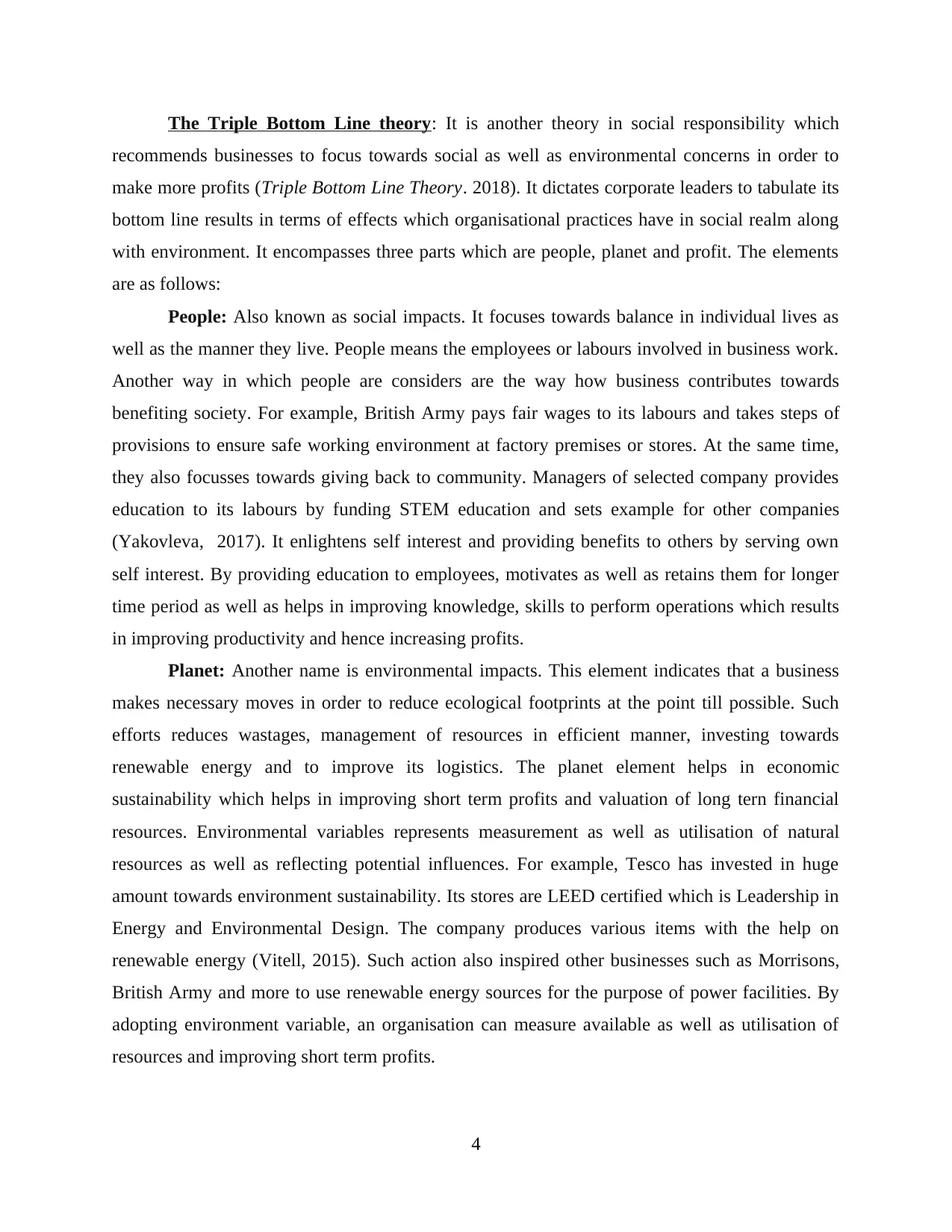
The Triple Bottom Line theory: It is another theory in social responsibility which
recommends businesses to focus towards social as well as environmental concerns in order to
make more profits (Triple Bottom Line Theory. 2018). It dictates corporate leaders to tabulate its
bottom line results in terms of effects which organisational practices have in social realm along
with environment. It encompasses three parts which are people, planet and profit. The elements
are as follows:
People: Also known as social impacts. It focuses towards balance in individual lives as
well as the manner they live. People means the employees or labours involved in business work.
Another way in which people are considers are the way how business contributes towards
benefiting society. For example, British Army pays fair wages to its labours and takes steps of
provisions to ensure safe working environment at factory premises or stores. At the same time,
they also focusses towards giving back to community. Managers of selected company provides
education to its labours by funding STEM education and sets example for other companies
(Yakovleva, 2017). It enlightens self interest and providing benefits to others by serving own
self interest. By providing education to employees, motivates as well as retains them for longer
time period as well as helps in improving knowledge, skills to perform operations which results
in improving productivity and hence increasing profits.
Planet: Another name is environmental impacts. This element indicates that a business
makes necessary moves in order to reduce ecological footprints at the point till possible. Such
efforts reduces wastages, management of resources in efficient manner, investing towards
renewable energy and to improve its logistics. The planet element helps in economic
sustainability which helps in improving short term profits and valuation of long tern financial
resources. Environmental variables represents measurement as well as utilisation of natural
resources as well as reflecting potential influences. For example, Tesco has invested in huge
amount towards environment sustainability. Its stores are LEED certified which is Leadership in
Energy and Environmental Design. The company produces various items with the help on
renewable energy (Vitell, 2015). Such action also inspired other businesses such as Morrisons,
British Army and more to use renewable energy sources for the purpose of power facilities. By
adopting environment variable, an organisation can measure available as well as utilisation of
resources and improving short term profits.
4
recommends businesses to focus towards social as well as environmental concerns in order to
make more profits (Triple Bottom Line Theory. 2018). It dictates corporate leaders to tabulate its
bottom line results in terms of effects which organisational practices have in social realm along
with environment. It encompasses three parts which are people, planet and profit. The elements
are as follows:
People: Also known as social impacts. It focuses towards balance in individual lives as
well as the manner they live. People means the employees or labours involved in business work.
Another way in which people are considers are the way how business contributes towards
benefiting society. For example, British Army pays fair wages to its labours and takes steps of
provisions to ensure safe working environment at factory premises or stores. At the same time,
they also focusses towards giving back to community. Managers of selected company provides
education to its labours by funding STEM education and sets example for other companies
(Yakovleva, 2017). It enlightens self interest and providing benefits to others by serving own
self interest. By providing education to employees, motivates as well as retains them for longer
time period as well as helps in improving knowledge, skills to perform operations which results
in improving productivity and hence increasing profits.
Planet: Another name is environmental impacts. This element indicates that a business
makes necessary moves in order to reduce ecological footprints at the point till possible. Such
efforts reduces wastages, management of resources in efficient manner, investing towards
renewable energy and to improve its logistics. The planet element helps in economic
sustainability which helps in improving short term profits and valuation of long tern financial
resources. Environmental variables represents measurement as well as utilisation of natural
resources as well as reflecting potential influences. For example, Tesco has invested in huge
amount towards environment sustainability. Its stores are LEED certified which is Leadership in
Energy and Environmental Design. The company produces various items with the help on
renewable energy (Vitell, 2015). Such action also inspired other businesses such as Morrisons,
British Army and more to use renewable energy sources for the purpose of power facilities. By
adopting environment variable, an organisation can measure available as well as utilisation of
resources and improving short term profits.
4
⊘ This is a preview!⊘
Do you want full access?
Subscribe today to unlock all pages.

Trusted by 1+ million students worldwide
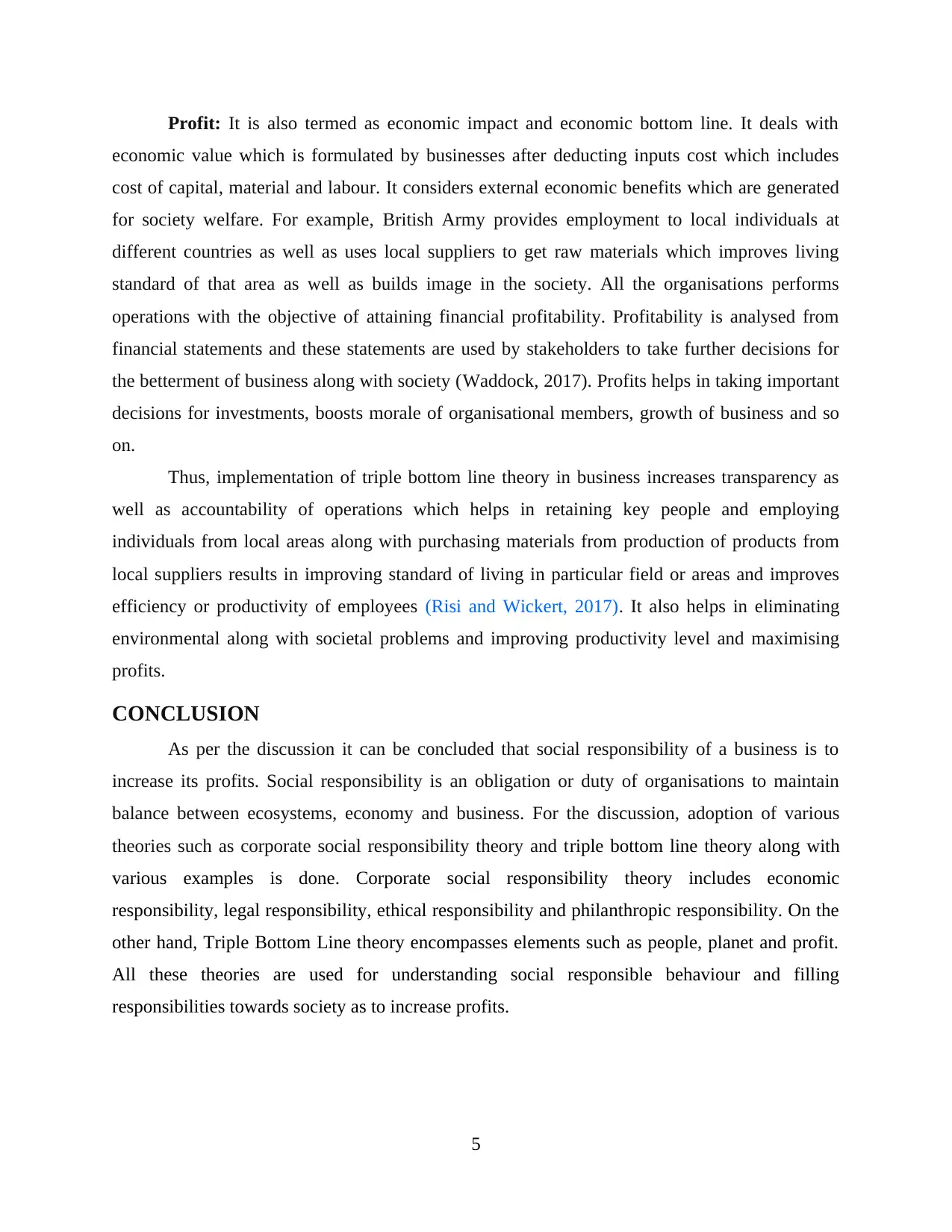
Profit: It is also termed as economic impact and economic bottom line. It deals with
economic value which is formulated by businesses after deducting inputs cost which includes
cost of capital, material and labour. It considers external economic benefits which are generated
for society welfare. For example, British Army provides employment to local individuals at
different countries as well as uses local suppliers to get raw materials which improves living
standard of that area as well as builds image in the society. All the organisations performs
operations with the objective of attaining financial profitability. Profitability is analysed from
financial statements and these statements are used by stakeholders to take further decisions for
the betterment of business along with society (Waddock, 2017). Profits helps in taking important
decisions for investments, boosts morale of organisational members, growth of business and so
on.
Thus, implementation of triple bottom line theory in business increases transparency as
well as accountability of operations which helps in retaining key people and employing
individuals from local areas along with purchasing materials from production of products from
local suppliers results in improving standard of living in particular field or areas and improves
efficiency or productivity of employees (Risi and Wickert, 2017). It also helps in eliminating
environmental along with societal problems and improving productivity level and maximising
profits.
CONCLUSION
As per the discussion it can be concluded that social responsibility of a business is to
increase its profits. Social responsibility is an obligation or duty of organisations to maintain
balance between ecosystems, economy and business. For the discussion, adoption of various
theories such as corporate social responsibility theory and triple bottom line theory along with
various examples is done. Corporate social responsibility theory includes economic
responsibility, legal responsibility, ethical responsibility and philanthropic responsibility. On the
other hand, Triple Bottom Line theory encompasses elements such as people, planet and profit.
All these theories are used for understanding social responsible behaviour and filling
responsibilities towards society as to increase profits.
5
economic value which is formulated by businesses after deducting inputs cost which includes
cost of capital, material and labour. It considers external economic benefits which are generated
for society welfare. For example, British Army provides employment to local individuals at
different countries as well as uses local suppliers to get raw materials which improves living
standard of that area as well as builds image in the society. All the organisations performs
operations with the objective of attaining financial profitability. Profitability is analysed from
financial statements and these statements are used by stakeholders to take further decisions for
the betterment of business along with society (Waddock, 2017). Profits helps in taking important
decisions for investments, boosts morale of organisational members, growth of business and so
on.
Thus, implementation of triple bottom line theory in business increases transparency as
well as accountability of operations which helps in retaining key people and employing
individuals from local areas along with purchasing materials from production of products from
local suppliers results in improving standard of living in particular field or areas and improves
efficiency or productivity of employees (Risi and Wickert, 2017). It also helps in eliminating
environmental along with societal problems and improving productivity level and maximising
profits.
CONCLUSION
As per the discussion it can be concluded that social responsibility of a business is to
increase its profits. Social responsibility is an obligation or duty of organisations to maintain
balance between ecosystems, economy and business. For the discussion, adoption of various
theories such as corporate social responsibility theory and triple bottom line theory along with
various examples is done. Corporate social responsibility theory includes economic
responsibility, legal responsibility, ethical responsibility and philanthropic responsibility. On the
other hand, Triple Bottom Line theory encompasses elements such as people, planet and profit.
All these theories are used for understanding social responsible behaviour and filling
responsibilities towards society as to increase profits.
5
Paraphrase This Document
Need a fresh take? Get an instant paraphrase of this document with our AI Paraphraser
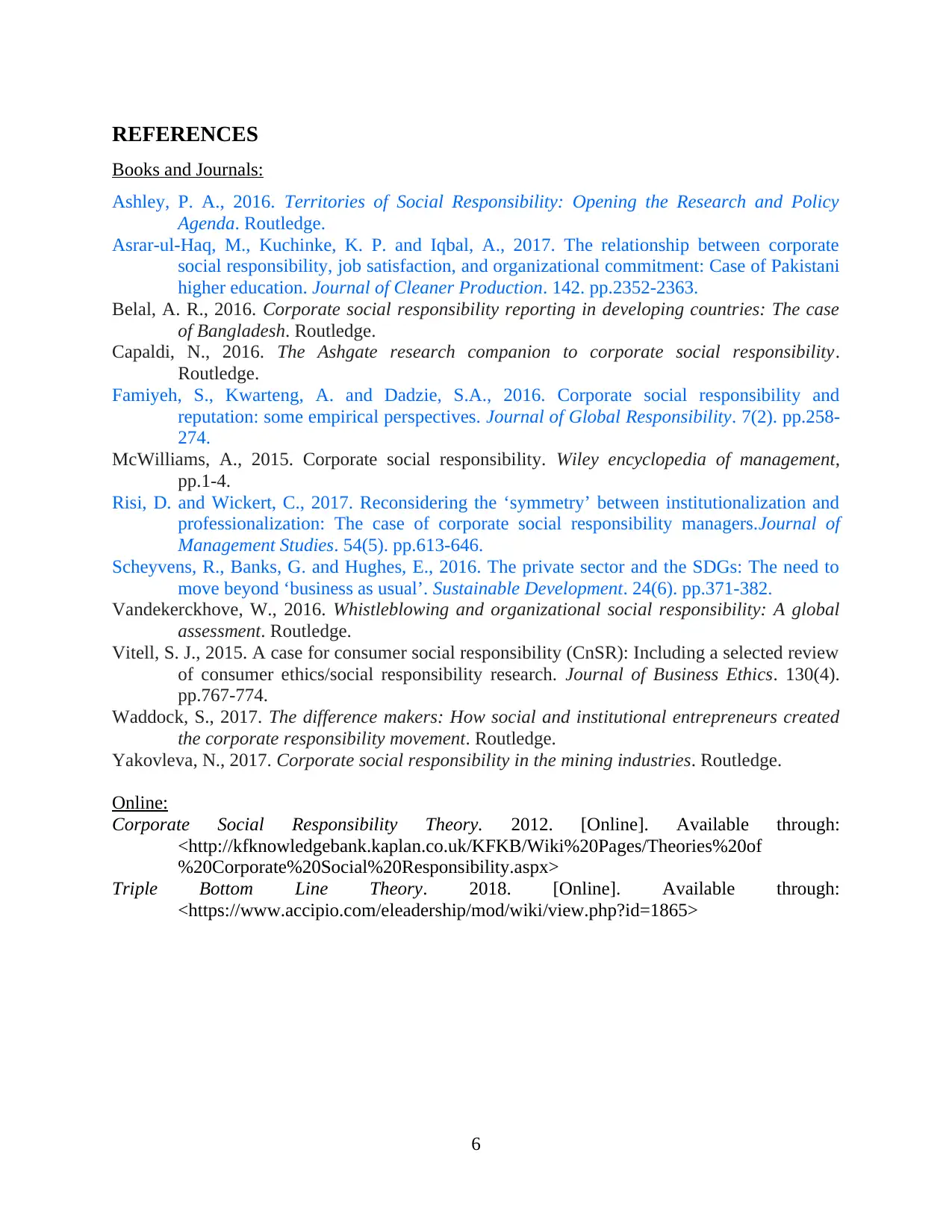
REFERENCES
Books and Journals:
Ashley, P. A., 2016. Territories of Social Responsibility: Opening the Research and Policy
Agenda. Routledge.
Asrar-ul-Haq, M., Kuchinke, K. P. and Iqbal, A., 2017. The relationship between corporate
social responsibility, job satisfaction, and organizational commitment: Case of Pakistani
higher education. Journal of Cleaner Production. 142. pp.2352-2363.
Belal, A. R., 2016. Corporate social responsibility reporting in developing countries: The case
of Bangladesh. Routledge.
Capaldi, N., 2016. The Ashgate research companion to corporate social responsibility.
Routledge.
Famiyeh, S., Kwarteng, A. and Dadzie, S.A., 2016. Corporate social responsibility and
reputation: some empirical perspectives. Journal of Global Responsibility. 7(2). pp.258-
274.
McWilliams, A., 2015. Corporate social responsibility. Wiley encyclopedia of management,
pp.1-4.
Risi, D. and Wickert, C., 2017. Reconsidering the ‘symmetry’ between institutionalization and
professionalization: The case of corporate social responsibility managers.Journal of
Management Studies. 54(5). pp.613-646.
Scheyvens, R., Banks, G. and Hughes, E., 2016. The private sector and the SDGs: The need to
move beyond ‘business as usual’. Sustainable Development. 24(6). pp.371-382.
Vandekerckhove, W., 2016. Whistleblowing and organizational social responsibility: A global
assessment. Routledge.
Vitell, S. J., 2015. A case for consumer social responsibility (CnSR): Including a selected review
of consumer ethics/social responsibility research. Journal of Business Ethics. 130(4).
pp.767-774.
Waddock, S., 2017. The difference makers: How social and institutional entrepreneurs created
the corporate responsibility movement. Routledge.
Yakovleva, N., 2017. Corporate social responsibility in the mining industries. Routledge.
Online:
Corporate Social Responsibility Theory. 2012. [Online]. Available through:
<http://kfknowledgebank.kaplan.co.uk/KFKB/Wiki%20Pages/Theories%20of
%20Corporate%20Social%20Responsibility.aspx>
Triple Bottom Line Theory. 2018. [Online]. Available through:
<https://www.accipio.com/eleadership/mod/wiki/view.php?id=1865>
6
Books and Journals:
Ashley, P. A., 2016. Territories of Social Responsibility: Opening the Research and Policy
Agenda. Routledge.
Asrar-ul-Haq, M., Kuchinke, K. P. and Iqbal, A., 2017. The relationship between corporate
social responsibility, job satisfaction, and organizational commitment: Case of Pakistani
higher education. Journal of Cleaner Production. 142. pp.2352-2363.
Belal, A. R., 2016. Corporate social responsibility reporting in developing countries: The case
of Bangladesh. Routledge.
Capaldi, N., 2016. The Ashgate research companion to corporate social responsibility.
Routledge.
Famiyeh, S., Kwarteng, A. and Dadzie, S.A., 2016. Corporate social responsibility and
reputation: some empirical perspectives. Journal of Global Responsibility. 7(2). pp.258-
274.
McWilliams, A., 2015. Corporate social responsibility. Wiley encyclopedia of management,
pp.1-4.
Risi, D. and Wickert, C., 2017. Reconsidering the ‘symmetry’ between institutionalization and
professionalization: The case of corporate social responsibility managers.Journal of
Management Studies. 54(5). pp.613-646.
Scheyvens, R., Banks, G. and Hughes, E., 2016. The private sector and the SDGs: The need to
move beyond ‘business as usual’. Sustainable Development. 24(6). pp.371-382.
Vandekerckhove, W., 2016. Whistleblowing and organizational social responsibility: A global
assessment. Routledge.
Vitell, S. J., 2015. A case for consumer social responsibility (CnSR): Including a selected review
of consumer ethics/social responsibility research. Journal of Business Ethics. 130(4).
pp.767-774.
Waddock, S., 2017. The difference makers: How social and institutional entrepreneurs created
the corporate responsibility movement. Routledge.
Yakovleva, N., 2017. Corporate social responsibility in the mining industries. Routledge.
Online:
Corporate Social Responsibility Theory. 2012. [Online]. Available through:
<http://kfknowledgebank.kaplan.co.uk/KFKB/Wiki%20Pages/Theories%20of
%20Corporate%20Social%20Responsibility.aspx>
Triple Bottom Line Theory. 2018. [Online]. Available through:
<https://www.accipio.com/eleadership/mod/wiki/view.php?id=1865>
6
1 out of 8
Related Documents
Your All-in-One AI-Powered Toolkit for Academic Success.
+13062052269
info@desklib.com
Available 24*7 on WhatsApp / Email
![[object Object]](/_next/static/media/star-bottom.7253800d.svg)
Unlock your academic potential
Copyright © 2020–2026 A2Z Services. All Rights Reserved. Developed and managed by ZUCOL.




